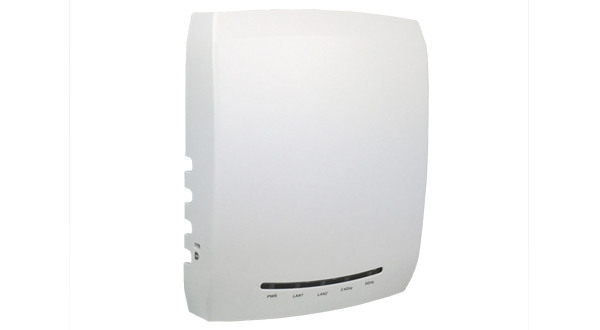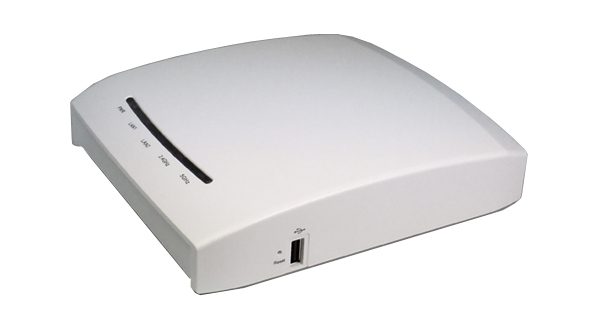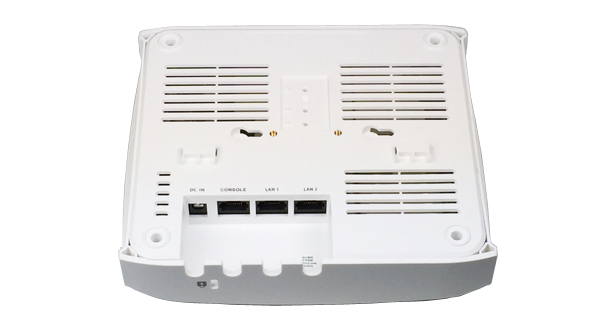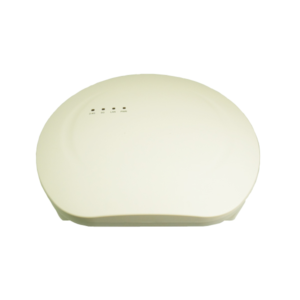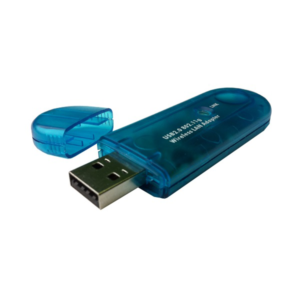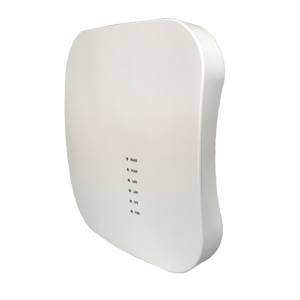Description
The WAP43DC is a dual band (2.4GHz and 5GHz) 802.11ac access point, one of a series of high-performance gigabit wireless access points (APs) launched by Amer Networks. Part of the Acuity™ family of Access Points, which includes both internal and external antenna Access Points for 802.11n and 802.11ac. The WAP43DC uses the latest technologies such as 3×3:3 MIMO and OFDM and can provide high data transmission rates up to 1.3 Gbps. With these 802.11ac Access Points, multimedia environments like HD video conferencing can be implemented.
Featuring flexible installation, the WAP43DC can be installed on the wall, desk top, or ceiling mounted. The WAP43DC supports both local power supply and power over Ethernet (PoE), which may be selected by customers to adapt to their onsite power environments.
The WAP43DC can be used in stand alone mode, or with a Wireless Controller. This allows you to future proof your wireless network, and migrate to a controller solution, when the number of access points warrants it.
The WAP43DC is a powerfully stand alone access point, but when combined with a controller solution, it becomes a true enterprise level central management solution.
Controller Based
The WAP43DC can be integrated with Amer’s extensive line of Controller solutions. Using a controller will enhance the AP to a full enterprise solution for your network.
The controller will allow to to easily manage up to 1024 AP’s, all from a single web gui. You will get unparalleled access to all wifi functions, which are not available in a cloud solution. This allows the AP to be better integrated into an existing network, or into a complex network environment. You can control up to 16 SSID’s, and have them broadcast on any of the Ap’s managed by the controller. This also gives you the ability to quickly scale your wifi network as your wireless demand grows in size. The controller also give the ability to manage and troubleshoot all AP from one web gui, making the process a lot smoother. The controller is an internal device, so your sensitive data is not out in the cloud and cant be effect by outside issues.
The Benefits of the controller solution are:
| Cluster controller max | 64 |
| Max # of wireless users | 5K |
| Vlans | 4K |
| ARP table | 8K |
| L2 protocols | IEEE802.3{u,ab} VLAN, COS, Port control, IGMP Snooping, MLD Snooping GVRP, PVLAN |
| L3 protocols | Static Routing,RIPv1/v2, OSPF, VRRP, IGMP v1/v2/v3, ARP, PIM-SM, PIM-DM, PIM-SSM |
| Wireless protocols | 802.11{a/b/g/n/ac/d/h/i/e/k} |
| CAPWAP protocol | Supports AP and AC discovery and upgrading |
| Redundancy | 1 1 fast backup, N 1 backup, N N backup ,Portal 1 1 backup. |
| RF Management Features | Blind area detection and repair, RF interference detection and avoidance, Terminal-based airtime fairness scheduling, User access control, Automatic aging of traffic-free users, Prohibiting the access of clients with weak signals, Remote probe analysis. |
| Security Features | 64/128 WEP, dynamic WEP, TKIP, CCMP, and SMS encryption, WAPI/LDAP/MAC Authentication, Portal Authentication, White and blacklist control, User isolation, Schedule, control of free resources, AP authentication,WIDS, WIPS. |
| Forwarding | IPv4 and IPv6 network support, multicasting, fast roaming between APs and controllers. |
| QoS | Mapping of different SSIDs/VLANs to different QoS policies, access control of MAC, IPv4, and IPv6 data packets, load balancing based on number of users,traffic, frequency bands, CAC based on the number of users, bandwidth limit based on APs, SSIDs, terminals, data streams, power saving mode, multicast-to-unicast mechanism, automatic emergency mechanism of APs, intelligent identification of terminals, 802.11e (WMM); and 4-level priority queues. |
| Management | Web management, CLI, Telnet, SSH support, SNMP v1/v2 /v3, Local logs, Syslog, and log file export, alarm, fault detection, statistics, dual-image (dual-OS) backup, hardware watchdog. |
Stand Alone Mode
The Ap can also function in stand alone or (FAT) mode. This allows for a smaller installation, with each AP managed by a separate web gui. The AP has full support for up to 16 SSID’s, and you can fully customize the wifi options on each AP.
This gives you the flexibility to install 1 AP in a small office, which will cover the whole location. Then if required you can add more AP and give the the same of a different SSID depending on the requirement.
The benefits of stand alone are:
| WLAN Function (FAT) | Dynamic channel adjustment, transmit power control, blind area detection and repair, SSID hiding, RTS/CTS. Hybrid access, restrict access based on number of users, airtime fairness, high-density application optimization. |
| Security (FAT) | 64/128 WEP Encryption, dynamic WEP, TKIP and CCMP. 802.11i and WAPI support. |
| Forwarding (FAT) | Static IP address, DHCP support, local forwarding, WDS support. |
| QoS (FAT) | WMM support, 802.1P priority mapping, QoS policy mapping, power saving mode. |
| Management (FAT) | local and remote, user statistics, remote probe analysis, switch AP mode, dual image support |
| 11n enhancements (Both) | 40 MHz bundling, 300 Mbps (PHY), Frame aggregation (A-MPDU), Maximum likelihood demodulation(MLD), Transmit beam forming (TxBF), Low-density parity-check code (LDPC), Maximum ratio combining (MRC), Space-time block coding (STBC) |
| WLAN Function (FIT) | RF environment scanning, Link integrity check, Forced roaming of terminals with weak signals |
| Security (FIT) | MAC address authentication, PEAP authentication, WIDS/WIPS, Real-time spectrum protection ,Protection against DoS attacks: Anti-DoS for wireless management packets, Forwarding security: Frame filtering, white list, static blacklist, and dynamic blacklist, User isolation: AP L2 forwarding suppression, Isolation between virtual APs (multiple SSIDs), Periodic SSID enabling and disabling, free resource control, wireless SAVI, ACL support, AP authentication control. |
| Forwarding (FIT) | IPv4 and IPv6 forwarding, Portal support, multicast, roaming across multiple controllers, AP switching reference, |
| QoS (FIT) | L2 to L4 packet filtering, Load balancing, Bandwidth limitations, Emergency failover, terminal identification, multicast enhancement. |
| Management (FIT) | AP statistics, controller statistics, syslog logging, alarm support, fault detection, watchdog, mode control. |

